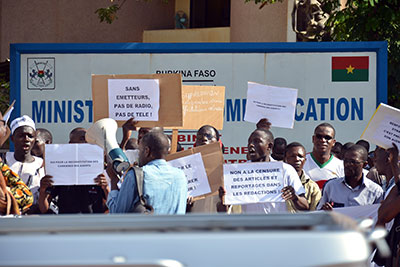In Burkina Faso, tens of journalists from state media today held a sit-in in front of the Ministry of Communications in the capital Ouagadougou to protest what they deem to be excessive government censorship of news coverage.
Journalists from the national public broadcaster Radiodiffusion Télévision du Burkina (RTB) and the Sidwaya stable of publications, including Burkina Information Agency (AIB), held up signs reading “No to Censorships of Articles and Reportages In Newsrooms,” “Facts are Sacred, Comments Are Free,” “We’ve Had Enough,” along with other signs calling for better working conditions. The protest was initiated by two independent press unions, the Autonomous Syndicate of Information and Culture Workers (SYNATIC) and the Association of Journalists of Burkina, according to news reports.
It was the first time that journalists from state-run media have publicly broken their collective silence over what the public has long believed to be entrenched practices of editorial direction and control by official censors. The show of discontent was the latest in a series of recent demonstrations by various segments of society opposing government policies and protesting the standard of living, according to news reports.
The government tried to dismiss accusations of tampering with news coverage after the sit-in was announced. “I have never given directives to anybody,” Communications Minister and Government Spokesman Alain Edouard Traoré declared at a press conference on Monday, according to RTB. He said the station “operates in total independence” from his office. “We do not constitute a ministry of propaganda,” private news site Burkina 24 quoted him as saying.
When pressed, the minister acknowledged that state media receives what he termed “guidance” from the government, Burkina 24 reported. Traoré declined to elaborate. “It’s not good to relay a number of things we do to remind a certain number of things [to journalists]. We don’t want violence on television,” he told the press conference. A September 2011 white paper from the ministry on government communication policy noted the “excessive use” of state television “as a medium of communication of institutional image,” and that within state media, there is a “poor understanding of the status of public service bodies.”
“Sometimes, they give directives to the director or the editor-in-chief who act as censors. Sometimes, it’s the zeal from the editor-in-chief,” according to Sidiki Dramé, a sportscaster with state radio and spokesman for the SYNATIC press union. “We are not going to make things up anyway. It has become exaggerated, that’s why we are shouting that we are fed up,” he told CPJ. For instance, the protesters charge that an official of the communication ministry stormed RTB’s studios to oversee the final cut of a report on an anti-government march on June 29. They claim that the report was cut substantially and an interview with opposition leader Zéphirin Diabré was removed.
RTB’s favorable coverage of the government has also made it more difficult for its reporters to cover anti-government protests, according to Dramé. Several RTB journalists have been intimidated or assaulted at protests based on the perception of the station’s pro-government bent. Other acts of intimidation may go unreported.
“Censorship is a useless thing in a democracy,” Burkina 24 quoted Traoré as saying. But Burkina Faso’s democratic credentials are questionable. While President Blaise Compaoré plays a leading role in mediation efforts in response to political crises, coups, and other conflicts troubling West Africa, he has maintained a tight grip on power during his 26-year reign. After seizing control in a bloody coup in 1987, Compaoré swept four elections with an average of 86% of the vote.
His critics have sometimes ended up dead. For example, eminent investigative journalist Norbert Zongo was murdered in December 1998 while he was reporting on the torture and murder of a driver of the president’s brother. In 2006, a judge dropped the murder case without a single conviction. Every December, friends and colleagues of Zongo commemorate his killing by, among other things, buying air time to broadcast infomercials calling for justice. To date, the state broadcaster has never allowed such infomercials to air, according to local journalists.
“You cannot block information today, in the 21st century. We will continue our struggle. Public opinion supports us,” Dramé said. The journalists have vowed to pursue talks with the authorities until their demands for more independence, as well as better pay, equipment, and insurance, are met.
